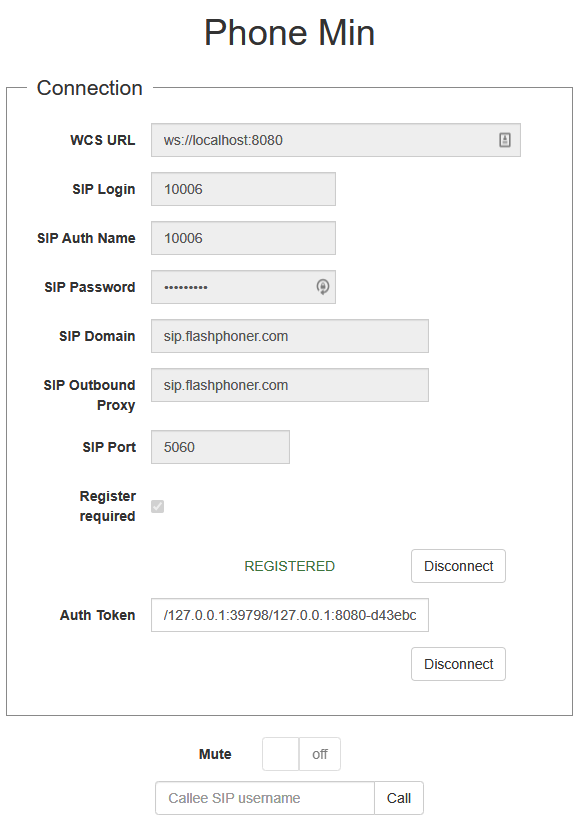
The path to the source code of the example on WCS server is:
/usr/local/FlashphonerWebCallServer/client/examples/demo/sip/phone
phone.css - file with styles
phone.html - page of the web phone
call-fieldset.html - form with fields required for connection
call-controls.html - HTML code for call controls
phone.js - script providing functionality for the web phone
This example can be tested using the following address:
https://host:8888/client/examples/demo/sip/phone/phone.html
Here host is the address of the WCS server.
To analyze the code, let's take the version of file phone.js with hash ecbadc3, which is available here and can be downloaded with corresponding build 2.0.212.
1. Initialization of the API
Flashphoner.init() code
Flashphoner.init(); |
2. Connection to server.
Flashphoner.createSession() code
Object with connection options is passed to the method
function createSession(authToken) {
var url = $('#urlServer').val();
var registerRequired = $("#sipRegisterRequired").is(':checked');
var sipOptions = {
login: $("#sipLogin").val(),
authenticationName: $("#sipAuthenticationName").val(),
password: $("#sipPassword").val(),
domain: $("#sipDomain").val(),
outboundProxy: $("#sipOutboundProxy").val(),
port: $("#sipPort").val(),
registerRequired: registerRequired
};
var connectionOptions = {
urlServer: url,
keepAlive: true
};
if (authToken) {
connectionOptions.authToken = authToken;
} else {
connectionOptions.sipOptions = sipOptions;
}
//create session
console.log("Create new session with url " + url);
Flashphoner.createSession(connectionOptions).on(SESSION_STATUS.ESTABLISHED, function(session, connection){
...
});
} |
3. Receiving the event confirming successful connection
ConnectionStatusEvent ESTABLISHED code
On this event, the token is stored to connect to the same session in 1 hour
Flashphoner.createSession(connectionOptions).on(SESSION_STATUS.ESTABLISHED, function(session, connection){
setStatus("#regStatus", SESSION_STATUS.ESTABLISHED);
$("#authToken").val(connection.authToken);
onConnected(session);
if (!registerRequired) {
disableOutgoing(false);
}
}).on(SESSION_STATUS.REGISTERED, function(session){
...
}).on(SESSION_STATUS.DISCONNECTED, function(){
...
}).on(SESSION_STATUS.FAILED, function(){
...
}).on(SESSION_STATUS.INCOMING_CALL, function(call){
...
}); |
4. Receiving the event confirming successful registration on SIP server
ConnectionStatusEvent REGISTERED code
Flashphoner.createSession(connectionOptions).on(SESSION_STATUS.ESTABLISHED, function(session, connection){
...
}).on(SESSION_STATUS.REGISTERED, function(session){
setStatus("#regStatus", SESSION_STATUS.REGISTERED);
onConnected(session);
if (registerRequired) {
disableOutgoing(false);
}
}).on(SESSION_STATUS.DISCONNECTED, function(){
...
}).on(SESSION_STATUS.FAILED, function(){
...
}).on(SESSION_STATUS.INCOMING_CALL, function(call){
...
}); |
5. Receiving the event on incoming call
ConnectionStatusEvent INCOMING_CALL code
Flashphoner.createSession(connectionOptions).on(SESSION_STATUS.ESTABLISHED, function(session, connection){
...
}).on(SESSION_STATUS.REGISTERED, function(session){
...
}).on(SESSION_STATUS.DISCONNECTED, function(){
...
}).on(SESSION_STATUS.FAILED, function(){
...
}).on(SESSION_STATUS.INCOMING_CALL, function(call){
call.on(CALL_STATUS.RING, function(){
...
});
onIncomingCall(call);
}); |
6. Outgoing call.
session.createCall(), call.call() code
The following parameters are passed when call is created
var constraints = {
audio: true,
video: false
};
//prepare outgoing call
var outCall = session.createCall({
callee: $("#callee").val(),
visibleName: $("#sipLogin").val(),
localVideoDisplay: localDisplay,
remoteVideoDisplay: remoteDisplay,
constraints: constraints,
receiveAudio: true,
receiveVideo: false,
stripCodecs:"SILK"
...
});
outCall.call() |
7. Answering incoming call.
call.answer() code
Object with answer options is passed to the method
$("#answerBtn").off('click').click(function(){
$(this).prop('disabled', true);
var constraints = {
audio: true,
video: false
};
inCall.answer({
localVideoDisplay: localDisplay,
remoteVideoDisplay: remoteDisplay,
receiveVideo: false,
constraints: constraints,
stripCodecs:"SILK"
});
showAnswered();
}).prop('disabled', false); |
8. Outgoing call hangup.
call.hangup() code
$("#callBtn").text("Hangup").off('click').click(function(){
$(this).prop('disabled', true);
outCall.hangup();
}).prop('disabled', false); |
9. Incoming call hangup.
call.hangup() code
$("#hangupBtn").off('click').click(function(){
$(this).prop('disabled', true);
$("#answerBtn").prop('disabled', true);
inCall.hangup();
}).prop('disabled', false); |
10. Call hangup on session disconnection
call.hangup() code
function onConnected(session) {
$("#connectBtn, #connectTokenBtn").text("Disconnect").off('click').click(function(){
$(this).prop('disabled', true);
if (currentCall) {
showOutgoing();
disableOutgoing(true);
setStatus("#callStatus", "");
currentCall.hangup();
}
session.disconnect();
}).prop('disabled', false);
} |
11. Mute/unmute audio
currentCall.muteAudio(), currentCall.unmuteAudio() code
// Mute audio in the call
function mute() {
if (currentCall) {
currentCall.muteAudio();
}
}
// Unmute audio in the call
function unmute() {
if (currentCall) {
currentCall.unmuteAudio();
}
} |